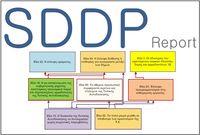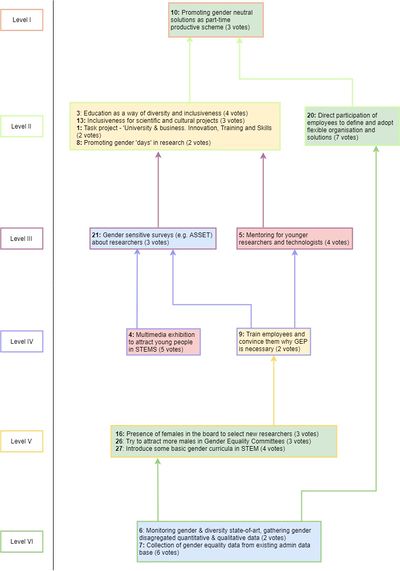R-I-Peers Rome SDDP Identification of best practices in the Gender Equality Arena within an organisation: Difference between revisions
No edit summary |
No edit summary |
||
| (9 intermediate revisions by 3 users not shown) | |||
| Line 12: | Line 12: | ||
|editor= [[Yiannis Laouris ]] | |editor= [[Yiannis Laouris ]] | ||
|total_duration=9 hrs | |total_duration=9 hrs | ||
|stats=Participants=15 <br> Number of ideas=29 <br>Number of Clusters=4 <br> Ideas received Votes=22 <br> Ideas on MAP R=15 | |stats=Participants=15 <br> Number of ideas=29 <br>Number of Clusters=4 <br> Ideas received Votes=22 <br> Ideas on MAP R=15 <br> Spreadthink ST=70.8% | ||
Spreadthink ST= | |||
|isbn=ISBN | |isbn=ISBN | ||
|link= | |link=[[Media:R&I_PEERS_SDD_Rome.pdf|Download Report]]<br> | ||
[[Media:R-I PEERS Deliverable SUBMITTED 6.6.pdf|Formal Report Rome & Ljubljana]] | |||
}} | }} | ||
| Line 25: | Line 25: | ||
The Mutual Learning workshop “Towards the identification of best practices in the Gender Equality Arena within an organisation” was organised by [[Consiglio Nazionale Delle Ricerche|CNR]], [[Cyprus Neuroscience and Technology Institute|CNTI]] and [[Asociacion - Centro de Investigacion Cooperativa en Nanociencias - CIC NANOGUNE (CIC nanoGUNE)|CIC nanoGUNE]] in the context of the project [[R&I PEERS]] funded by the European Union’s Horizon 2020 Research and Innovation Programme, on November 7th in Rome, Italy. | The Mutual Learning workshop “Towards the identification of best practices in the Gender Equality Arena within an organisation” was organised by [[Consiglio Nazionale Delle Ricerche|CNR]], [[Cyprus Neuroscience and Technology Institute|CNTI]] and [[Asociacion - Centro de Investigacion Cooperativa en Nanociencias - CIC NANOGUNE (CIC nanoGUNE)|CIC nanoGUNE]] in the context of the project [[R&I PEERS]] funded by the European Union’s Horizon 2020 Research and Innovation Programme, on November 7th in Rome, Italy. | ||
The workshop, which was realised using the participatory methodology of the Structured Democratic Dialogue (SDD), brought together fifteen (15) experts from the gender equality field representing universities, governmental and scientific bodies as well as enterprises to discuss the existing practices across Gender Equality Plans (GEPs). | The workshop, which was realised using the participatory methodology of the [[Structured Democratic Dialogue]] (SDD), supported by [[Concertina]], brought together fifteen (15) experts from the gender equality field representing universities, governmental and scientific bodies as well as enterprises to discuss the existing practices across Gender Equality Plans (GEPs). | ||
<br> | <br> | ||
Latest revision as of 05:50, 25 July 2023
|
Executive Summary
The Mutual Learning workshop “Towards the identification of best practices in the Gender Equality Arena within an organisation” was organised by CNR, CNTI and CIC nanoGUNE in the context of the project R&I PEERS funded by the European Union’s Horizon 2020 Research and Innovation Programme, on November 7th in Rome, Italy.
The workshop, which was realised using the participatory methodology of the Structured Democratic Dialogue (SDD), supported by Concertina, brought together fifteen (15) experts from the gender equality field representing universities, governmental and scientific bodies as well as enterprises to discuss the existing practices across Gender Equality Plans (GEPs).
The Triggering Question (TQ) of the workshop was:
"What existing practices can be identified to facilitate the development and implementation of Gender Equality Plans (GEPs) in academia and research organisations?"
In response to the TQ, the 15 participants came up with 29 ideas, which were categorized in 4 clusters. Following the voting process, 22 ideas received one or more votes and were structured to create the influence MAP shown below.
According to the participants of this workshop, the practices that appear to be the most influential were:
- Practice #6: (2 votes) Monitoring gender & diversity state-of-art, gathering gender disaggregated quantitative & qualitative data
- Practice #7: (6 votes) Collection of gender equality data from existing admin database
- Practice #16: (3 votes) Presence of females in the board to select new researchers
- Practice #26: (3 votes) Try to attract more males in Gender Equality Committees
- Practice #27: (4 votes) Introduce some basic gender curricula in STEM
The workshop was facilitated by Andreas P. Andreou.

